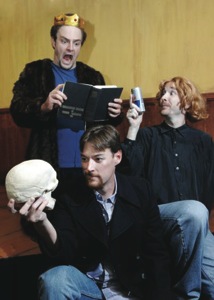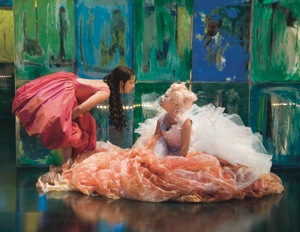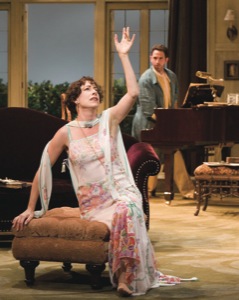-
- New York gives away condoms, offers AIDS education to seniors
- Same-sex marriage friends, foes hail domestic violence ruling
- Model-dancer sues nightclub
- Washington same-sex couples line up to register as domestic partners
- Washington interfaith group files brief in Iowa same-sex marriage case
- Man must pay alimony to wife despite her domestic partnership
- National News Briefs
- World News Briefs
Arts & Entertainment
The trivial, the deceivers and short-form Willie
Published Thursday, 02-Aug-2007 in issue 1023
The Complete Works of William Shakespeare (Abridged)
There’s something inherently funny in the prospect of galloping through the Shakespearean theatrical canon of 38 plays in 90 minutes (actually, it’s 97 or so, but who’s counting?)
The Reduced Shakespeare Company, a trio of Californians in the Sonoma area, wrote The Complete Works of William Shakespeare (Abridged) in the 1980s; it went on to a 10-year run in London’s West End and has since played in some 17 countries. The company has written several other shows; one, The Bible: The Complete Word of God (Abridged) will play at San Diego Repertory Theatre in October.
Directed by Daniel Zisko, Abridged Shakespeare plays through Aug. 11 at OnStage Playhouse.
The local company – Brian P. Evans (last seen in Cabaret), Nathan Plummer (The Graduate) and Desmond Hassing, deserting his longtime role as a techie has a great time wading, tiptoeing and bulldozing it’s way through this uneven script.
Some of the writing is inspired: Who wouldn’t love the history plays done as a football game? (“Fictional character on the field. Lear is disqualified!”) And how about Othello as rap? (Hey, why not? Film fans may recall the recent O, which set it on a basketball court.)
Then there’s the gruesome Titus Andronicus as a grisly cooking show (“Ladyfingers for dessert”). And the Scottish play (Macbeth, but don’t say I told you) done in a Scottish accent.
The cast is talented and energetic, but saddled with a script that too often degenerates to the puerile. Des (Hassing), playing the Shakespeare scholar, speaks of his soon-to-be-released book I Love My Willie. Romeo says, “Call me but love.” Juliet responds, “OK, you’re butt love.”
This show has been around a long time, and topical references have been tossed in to make it seem more au courant. But mentions of Paris Hilton and the Internet only seem to point up the age of the script.
An extended bit toward the end of the first act has Brian rushing offstage, unwilling to do the Hamlet section. What’s the point? It’s not funny, it stops the action and forces an unnecessary intermission.
This play has some genuinely funny parts, but could use a rewrite.
The Complete Works of William Shakespeare (Abridged) plays through Aug. 11 at OnStage Playhouse in Chula Vista. Shows Thursday through Saturday at 8 p.m. and Sunday at 2 p.m. For tickets, call 619-422-7787 or visit www.onstageplayhouse.org.
The Deception
Deception was the topic of much 18th century French literature. While novelists like Pierre Choderlos de Laclos and the Marquis de Sade were writing of lovers’ cruelties and deceptions, Pierre Marivaux was writing pieces such as La Fausse Suivante, about a woman who wants to steal another woman’s man.
In Marivaux’s world, only two things matter: money and love, in that order. Lelio (Casey Greig) is engaged to the Countess (Emily Gunyou Halaas). But another woman (Merritt Janson) has designs on him. She dresses en homme, calls herself Chevalier and pursues with the intention of – well, it’s not really clear what, perhaps character investigation.
From this point on, the mud gets thicker.
Dominique Serrand and Steven Epp, of Minneapolis-based Theatre de la Jeune Lune, have adapted La Fausse Suivante and present The Deception through Aug. 19 at La Jolla Playhouse’s Sheila and Hughes Potiker Theatre. Serrand directs.
The Deception raises so many questions, I lost track of the plot. In fact, after a while I lost interest in it. There are unexplained characters and so much odd stage business that frustration rather than fascination is the result.
The questions start when you enter the theater. The play is set in the French estate of a countess. There is no furniture, only floor-to-ceiling glass panes smeared with yellow, blue and green paint. Modern art, perhaps, but what is it intended to suggest?
In this 18th century play, adapters Dominique Serrand and Steven Epp have updated the language to the point of pulling at least this viewer out of the play several times. Call me an old fogey, but words like “fuckwad” and, for that matter, “fuck” seem better suited to the 20th century, if used at all.
If the language (at least some of it) is contemporary and the set suggestive of modern art, what is the commedia dell’arte character Arlequino (Nathan Keepers) doing here? Keepers is an enormously talented physical actor, but it looks as if he wandered into the wrong theater.
And after all the deceptive craziness has transpired, what is the meaning of the medieval “Requiem” in the middle and at the end? A lovely piece, beautifully sung, but … why?
In Marivaux’s world, almost everyone is venal, greedy and ready to deceive anyone if there’s sufficient profit in it. It’s an unlikable crowd, wonderfully portrayed. Janson is a particular standout, closely followed by Cutler and the others.
There’s something to be said for innovation, but there’s something wrong when viewers have to keep asking: “Why?”
Lelio says it best: “It’s impossible to make any sense of this.”
The Deception plays through Aug. 19 at La Jolla Playhouse’s Sheila and Hughes Potiker Theatre. Shows Tuesday and Wednesday at 7:30 p.m.; Thursday and Friday at 8 p.m.; Saturday at 2 and 8 p.m.; Sunday at 2 and 7 p.m. For tickets, call 858-550-1010 or visit www.lajollaplayhouse.org.
Hay Fever
“A little sincerity is a dangerous thing, and a great deal of it is absolutely fatal.”
- Oscar Wilde
Fear not, there’s nary a trace of sincerity in anything any member of the Bliss family says. In fact, as daughter Sorel (Sarah Grace Wilson) says, “We none of us ever mean anything.”
The Bliss family and their houseguests play out an evening of saying a great deal and meaning nothing in Noel Coward’s Hay Fever, playing through Aug. 19 at the Old Globe Theatre, directed by Robert Longbottom.
Appalling behavior and interesting conversation (served up in Gregg Barnes’ fabulous costumes) are the plat du jour in Hay Fever, which takes place in the 1920s at the estate of the aforementioned Bliss family, a quartet given to extreme conversation and overblown emotion but little actual communication.
Judith Bliss (Judith Lightfoot Clarke), a retired (but not for long) actress, is devoted to exaggeration (to put it mildly) and the use of liberal quotations from previous roles.
Husband David (John Windsor-Cunningham) is a novelist just finishing his latest effort. Son Simon (Santino Fontana) and daughter Sorel are talented and sometimes charming misfits who delight in tormenting each other intellectually and verbally.
Each Bliss has (unbeknownst to the others) invited a guest for the weekend; the family will spend that time belittling the others’ guests.
Judith’s guest is the much younger Sandy Tyrell (Brian M. Slaten), on whom she has designs. “David’s been a good husband to me,” she says, “but he’s wearing a bit thin now.”
David has invited “the perfect flapper type” in young Jackie Coryton (Bridget Moloney), who is adorable if rather slower intellectually than the others.
Sorel has invited diplomat Richard Greatham (Alan Campbell); and Simon, the elegant Myra Arundel (Yvonne Woods), whom Judith says “goes about using sex as a sort of shrimping-net.”
Romantic dalliance is in the air; the unsuspecting guests are more victims than partners as their hosts alternately insult and seduce them. And word games are in order – Judith decides they should play Adverbs, a charade game in which people are asked to do something in the manner of the word.
Verbal sniping and uncomfortable events continue to escalate until finally the guests escape – unnoticed by the Bliss quartet, busy arguing about the layout of Parisian streets.
Clarke has the part to die for, and her Judith is pitch-perfect, hammy and hilarious. Wilson and Fontana are properly snarky and funny, Windsor-Cunningham delightfully aloof and all the guests properly and wonderfully horrified.
But the real star of this show is costume designer Gregg Barnes, whose art deco costumes are jaw dropping. Some are downright architectural. Andrew Jackness’ set is terrific, as is Christopher Akerlind’s lighting (note especially the last curtain call).
Often caustic, seldom serious, Coward made a living skewering the upper classes to which his fame gained him access and the theatrical community of which he was a member. Enormously successful, in 1925 he had four plays running simultaneously in the West End. Hay Fever was one of them.
If you come away thinking Hay Fever, based on a weekend Coward spent at actress Laurette Taylor’s house, is merely a bagatelle, you are absolutely right. Even Coward thought so. But what fun!
Hay Fever runs through Aug. 19 at the Old Globe Theatre. Shows Sunday, Tuesday and Wednesday at 7 p.m.; Thursday, Friday and Saturday at 8 p.m.; matinees Saturday and Sunday at 2 p.m. For tickets, call 619-23-GLOBE.
|
|
Copyright © 2003-2025 Uptown Publications




